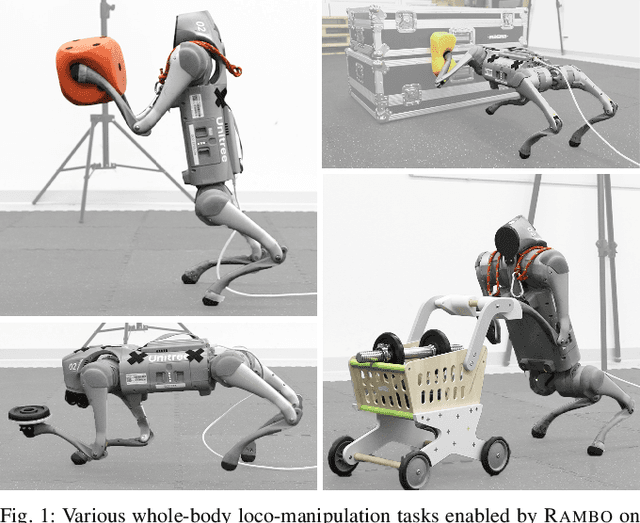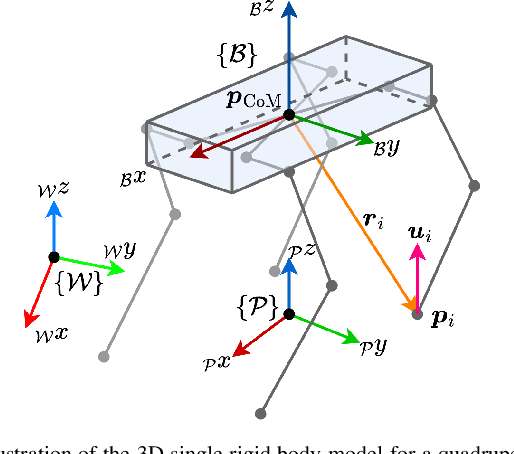Gabriele Fadini
Differentiable Material Point Method for the Control of Deformable Objects
Dec 15, 2025



Abstract:Controlling the deformation of flexible objects is challenging due to their non-linear dynamics and high-dimensional configuration space. This work presents a differentiable Material Point Method (MPM) simulator targeted at control applications. We exploit the differentiability of the simulator to optimize a control trajectory in an active damping problem for a hyperelastic rope. The simulator effectively minimizes the kinetic energy of the rope around 2$\times$ faster than a baseline MPPI method and to a 20% lower energy level, while using about 3% of the computation time.
RAMBO: RL-augmented Model-based Optimal Control for Whole-body Loco-manipulation
Apr 09, 2025



Abstract:Loco-manipulation -- coordinated locomotion and physical interaction with objects -- remains a major challenge for legged robots due to the need for both accurate force interaction and robustness to unmodeled dynamics. While model-based controllers provide interpretable dynamics-level planning and optimization, they are limited by model inaccuracies and computational cost. In contrast, learning-based methods offer robustness while struggling with precise modulation of interaction forces. We introduce RAMBO -- RL-Augmented Model-Based Optimal Control -- a hybrid framework that integrates model-based reaction force optimization using a simplified dynamics model and a feedback policy trained with reinforcement learning. The model-based module generates feedforward torques by solving a quadratic program, while the policy provides feedback residuals to enhance robustness in control execution. We validate our framework on a quadruped robot across a diverse set of real-world loco-manipulation tasks -- such as pushing a shopping cart, balancing a plate, and holding soft objects -- in both quadrupedal and bipedal walking. Our experiments demonstrate that RAMBO enables precise manipulation while achieving robust and dynamic locomotion, surpassing the performance of policies trained with end-to-end scheme. In addition, our method enables flexible trade-off between end-effector tracking accuracy with compliance.
Improving generalization of robot locomotion policies via Sharpness-Aware Reinforcement Learning
Nov 29, 2024



Abstract:Reinforcement learning often requires extensive training data. Simulation-to-real transfer offers a promising approach to address this challenge in robotics. While differentiable simulators offer improved sample efficiency through exact gradients, they can be unstable in contact-rich environments and may lead to poor generalization. This paper introduces a novel approach integrating sharpness-aware optimization into gradient-based reinforcement learning algorithms. Our simulation results demonstrate that our method, tested on contact-rich environments, significantly enhances policy robustness to environmental variations and action perturbations while maintaining the sample efficiency of first-order methods. Specifically, our approach improves action noise tolerance compared to standard first-order methods and achieves generalization comparable to zeroth-order methods. This improvement stems from finding flatter minima in the loss landscape, associated with better generalization. Our work offers a promising solution to balance efficient learning and robust sim-to-real transfer in robotics, potentially bridging the gap between simulation and real-world performance.
 Add to Chrome
Add to Chrome Add to Firefox
Add to Firefox Add to Edge
Add to Edge